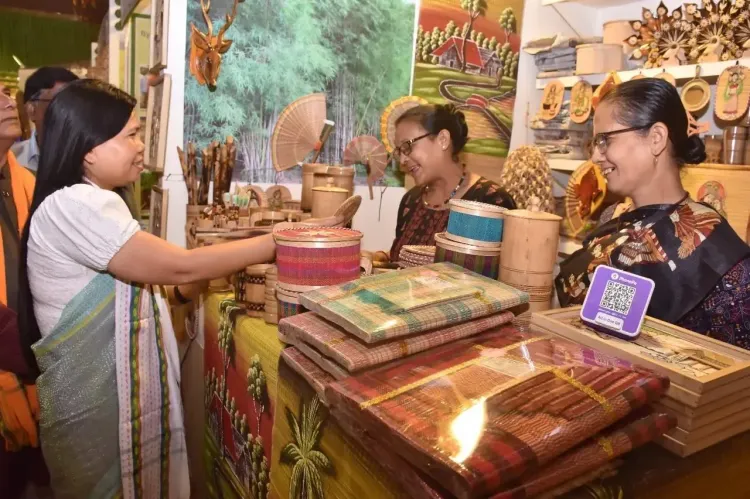How is World Bamboo Day Celebrated in the Northeast?

Synopsis
Key Takeaways
- Bamboo's cultural significance in the Northeast is profound.
- Innovative bamboo products are emerging, boosting local economies.
- Sustainable practices are essential for bamboo's future utilization.
- The establishment of training programs enhances artisan skills.
- Collaboration with agencies like CII promotes business in the bamboo sector.
Kohima/Agartala, Sep 19 (NationPress) World Bamboo Day 2025 was commemorated across the Northeastern states, emphasizing bamboo as the region's “green gold” and underscoring the importance of its enhanced utilization.
The celebrations took place at the Nagaland Bamboo Resource Centre in Chumoukedima, themed “Next Generation Bamboo: Solution, Innovation and Design.”
At the event, Development Commissioner Temsunaro Aier referred to bamboo as the “green gold” of Nagaland and other regional states, highlighting its profound cultural, ecological, and economic importance.
She encouraged stakeholders to uphold this legacy with pride and responsibility, pointing out bamboo's significance in food, housing, craftsmanship, art, and livelihoods.
Aier also emphasized the necessity for sustainable practices, mentioning bamboo's rapid growth, carbon absorption, and soil conservation benefits, making it a formidable ally in combating climate change.
The official praised the Nagaland Bamboo Development Agency (NBDA) for its efforts in promoting bamboo-based enterprises, training artisans, and supporting self-help groups.
She revealed that products like handicrafts, furniture, incense sticks, blinds, mats, and bamboo shoots are becoming increasingly recognized, establishing Nagaland as a center for bamboo industries.
During the celebration, Aier announced plans for a state-of-the-art Cane and Bamboo Technology Park at the Nagaland Bamboo Resource Centre, which will function as a hub for research, training, and production.
A week-long training initiative was launched for 26 artisans to refine their skills in bamboo design, manufacturing, and value addition.
Certificates and machinery were provided to the participants, and the Bamboo Entrepreneur Award was bestowed upon Bukhaio Khiamniungan. Additionally, a special publication titled “Facilitating Ease of Doing Business in the Bamboo Sector in Northeast India: Removal of Compliance Burdens” was introduced in collaboration with the Confederation of Indian Industry (CII).
The event featured a bamboo-themed song performed by Musik-A School and a keynote address by Kuko Mero, State Mission Director of NBDA, who stated that with over 43 bamboo species, Nagaland holds immense potential for sustainable bamboo development.
He shared that NBDA has conducted block plantations covering 1506 hectares, trained over 200 entrepreneurs and artisans, and established two Common Facility Centres that have created employment for more than 500 people.
The Agency has also set up processing units, nurseries with 1.5 lakh saplings, rural haats, bamboo bazaars, and enhanced the Nagaland Handicrafts Emporium in New Delhi and Kolkata under the brand “Naturally Nagaland.”
In Tripura, discussions on World Bamboo Day involved the state’s Industries and Commerce Minister Santana Chakma and Forest and Environment Minister Animesh Debbarma, who engaged with investors and industrialists regarding the significance of bamboo resources.
Forest officials revealed that almost 44% of Tripura's geography is covered in bamboo, with the state government exploring avenues for high-value bamboo applications, including in renewable energy and bio-ethanol production.
Shailesh Kumar Yadav, Mission Director of the Tripura Bamboo Mission, stated: “We are exploring potential investors interested in bio-ethanol. One metric ton of high-quality bamboo can yield approximately 200–300 liters of bio-ethanol. The central government already has a bio-ethanol policy for blending with fossil fuels like petrol and diesel, and recently a bio-ethanol plant has been established at Numaligarh Refinery in Assam.”
He noted that numerous private sector entities, alongside local entrepreneurs, are expressing interest in bio-ethanol and bio-char projects, with government support forthcoming. Yadav, also the Director of Industries and Commerce, highlighted the market potential, asserting that the global bamboo market was valued at USD 67 billion in 2024, while India’s bamboo economy stood at Rs 1,300 crore in exports, with the remainder consumed domestically.
Significantly, incense sticks alone had a market value of Rs 13,500 crore last year, with most round sticks imported from abroad.
“China currently leads as the largest global producer and exporter of bamboo, while India holds the third position in production but ranks first in imports due to limited value addition in the sector. Tripura likely possesses one of the largest bamboo resources in the nation, yet we have fallen behind in engineered bamboo products, mechanized large-scale production of ply, veneer, and other value-added items,” he acknowledged.
The official mentioned that while 25,000–30,000 individuals are presently engaged in Tripura’s bamboo sector, it has the potential to provide livelihoods for at least one lakh people.
A master plan, supported by the Asian Development Bank, is already in place to systematically and sustainably leverage Tripura’s bamboo resources for improved livelihoods and financial returns.
Currently, the state’s bamboo sector has an annual turnover of Rs 85–90 crore, with handicrafts constituting 25–30% of that share.
The World Bamboo Day 2025 was also celebrated in Mizoram and other Northeastern states.








